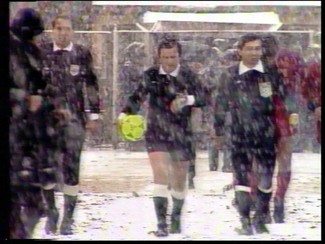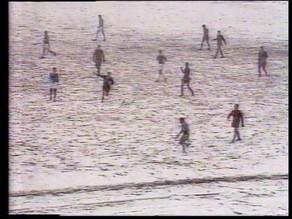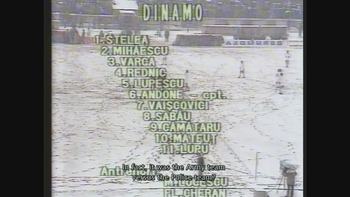
The Second Game is an odd little film to say the least. Clocking in at just over an hour and a half, this particularly quiet and rather slapdash documentary depicts the entirety of a single football match – played on 3rd December 1988 between Romanian club teams Dinamo and Steaua as thick snow fell over the pitch – and a few minutes of introductory footage taken from the original coverage reels. The only two cast members are director Corneliu Porumboiu and his father, Adrian, the referee who – sporting a fetching mullet and moustache combo – presided over the match.

The topic, it seems, is left to define itself. The elder Porumboiu offers a little background, mixing shop talk – one team was more about speed and technical skill whilst the other was developing a dynamic with new names; the heavy snow falling over the pitch caused visibility problems and poor traction for the players but, as long as they could see the goals, broke no official rules – and politics, sharing stories of shadowy attempts by equally shadowy authorities to influence the outcome of the match via his services. As he tells it, both the police force and the communist secret police were supporting Dinamo whilst the army had eyes for their rivals, and both groups tried intimidation tactics – a captain waiting for Porumboiu at a train station and another escorting him to discuss intended results with a commander – before he rather bravely reported them all to the governing sports body and found himself off the hook as they sought to save face.
This seems to set a tone for the sparse film, the match representing a historical event that epitomised the zeitgeist of the late communist period, showcasing the enthusiasm for the sport itself as well as the bizarre goings-on behind the scenes on the part of the Ceausescu government – when an injured player is taken off, for example, the cameras focus instead on showing of the scale of the enthusiastic crowd watching a fair contest. At one point, perhaps confirming this idea, the elder Porumboiu points out that, had the match occurred in ’89 rather than ’88, it might have been seen as a key event for the revolutionary Romanians.

What, then, do Porumboiu’s other films look like? His 2006 portrait of a group of his hometown’s natives reflecting on the ’89 Revolution that ousted Ceausescu, 12:08 East of Bucharest, won the Camera d’Or for Best First Film at Cannes. 2009’s Police, Adjective follows a policeman’s crisis of ethics whilst investigating a teenager for smoking hash. It seems for the most part to be thoughtful stuff, riddled with the inevitable interest in political history affecting anyone working in the former satellite states, yet none have been quite so stripped down – or ambitious in the same way – as The Second Game. It’s a little reminiscent of Kryzstzof Kieslowski’s early documentaries and their attempts to capture ordinary working life under 1980s communist rule, but obviously lacking his renowned visual flair or, indeed, any noticeable narrative besides the pace of a match as it was broadcast almost twenty years ago.
Increasingly throughout the film and particularly the second half, it’s more like an audiobook or a radio programme playing in the background. Since there seems to be little enthusiasm for the match even on the part of the two commentators and none of the original sound has been used, it’s nothing at all like watching one and there is no reason to even look at the screen except to check the subtitles in search of some interesting dialogue. There’s little to be found, since the elder Porumboiu seems close to bored.
I played a few games of solitaire whilst watching it at the same time and got up to make some tea without feeling the need to pause, since there didn’t seem to be anything to miss. Other films at the EEFF have shown that it’s possible to be captivated without much in the way of audio or storytelling, but this cultural snapshot from Corneliu Porumboiu has dialled things down a little too much. I was expecting something a little more impassioned, particularly from the point of view of a football fan and the son of the referee at this apparently relevant contest. As it is, the potentially interesting spontaneous interview is all but detached from its one, monotonous visual aid and falls fairly flat. It might be interesting to know exactly who Porumboiu’s intended audience was or exactly what it was he was trying to capture or convey in his ninety-minute time capsule piece, since it’s so bare and so subdued that it’s almost impossible to tell.
The Second Game is screening at the East End Festival. It will be showing at Rich Mix on the 19th of June, you can buy ticketshere!

 RSS Feed
RSS Feed
